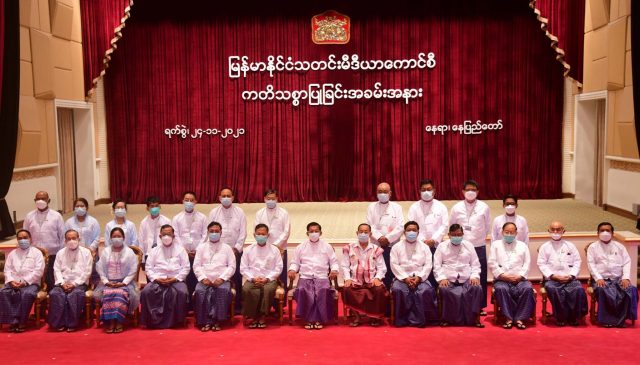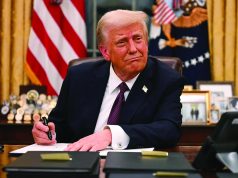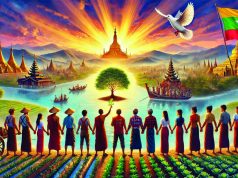The new Myanmar Press Council (MPC) was sworn in in a ceremony of affirmation in Nay Pyi Taw on November 25, to serve a new three year term from 2022 – 2024. The burden placed on its shoulder has never been greater amidst the incessant bombardment in the social media of fake news by previous brand name news organisations such as DVP, Khit Thit, Irrawaddy, 7 Day, Myanmar Now, etc. Pushing forward agenda from NNPC (NUG, NLD, PDF, CRPH) terror organisations through funding from overseas organisations with an ulterior motive to destroy the country and the people, these online news agencies consistently create and distribute fake news, personal attacks without evidence, and destroy the unity of the nation.
Press councils can be seen in various forms in most of the democratic countries throughout the world to protect the freedom of media and the interests and rights of media personnel and the people. The government is placing emphasis on the duty and functions of the Myanmar Press Council as the media is recognised as the fourth pillar in Myanmar democratic transformation which monitors the legislative, executive and judicial estates for perpetual righteousness and supports them under criticism and suggestions.
The Myanmar Press Council is responsible for helping media personnel cover and publishes the information in a free manner and for disseminating the correct and accurate information to the people. In meeting with members of the Myanmar Press Council the other day, the Prime Minister affirmed that he would try to continuously fulfil the needs of the Myanmar media arena in accordance with the media ethics to contribute to the improvement of socio-economic life of the people, to improve the news and media technologies on a wider scale and to be able to grasp the opportunities for pursuing the modern media technologies meeting the international standards and ethics.
Now almost all online only media, are serving a single person, party or organisation interest, instead of the Nation or the Sate. Reporting is extremely biased against the the government and the Tatmataw. Even when the evidence is contrary to what they are saying, these online media or social influencers choose to ignore the evidence and push their unscrupulous agenda. They would present their opinions as facts in always all the circumstances. Sharing to spread the fake news such as government planning to delegitimise 10,000 Kyats notes is an apple pie and custard for them. These fake news in turn, influence the uneducated youth and influencers of NNCP forced them into becoming armed terrorists. It is necessary to transform the soul of each media person in the subjectivity into the objectivity. This job would be a tough row to hoe for the MPC.
The media is a primary estate for turning out the educated generations with correct attitudes and ideologies to be able to lead the State’s future as part of efforts for ensuring peace, stability and development of the country. The media arena should not have reliance over others, attachment and colours and must be free from any influences. If so, media personnel adhering to the ethics and laws will have the chance to disseminate the true information to the people.
In reviewing the aim to form the MPC, everybody generally understands that the council shall protect the press freedom and rights and interests of the media personnel. Actually, the theme of forming the MPC is to protect the freedom of media and the interests and rights of media personnel and the people. MPC needs to help media personnel cover and publish the information in a free manner and is responsible for disseminating the correct and accurate information to the people.
How do we ensure that fake news do not continue to spread especially on social media. One way is engagement with the platform itself, between the platform (in Myanmar’s case – Facebook) and the government. Without Facebook, more than 90% of NNCP activities would come to a halt. They established offices, issued orders, begged for donations, boasted about their mediocre success and shared their terrorist activities, and even issued illegal bonds all online through social media. If the platform is no longer available, the same thing would happen to the air government. The second approach is not be part of the conversation i.e., ignorance is a bliss. The government and people affected by the fake news are following this route. Yet when the audience is ignorant and uneducated, the fake news cannot be left on its own. The government did hold press conferences monthly to clarify things and eradicate the fake news.
The media, the fourth estate of a country, plays a crucial role in the enhancement of the rights of expression for the democracy and can improve the transparency of the government by disseminating the deserved knowledge to each people, showing the importance of the knowledge accumulation of media personnel. If media personnel understand all situations of the country and global issues including the religions, literature, culture and history, these will contribute much to their profession. Hence, they need to always do reading and studies for having the capability to share their knowledge with people. In this regard, they should stand in accord with the media ethics to be free from racism, dogmatism, party attachment, personal cult and political influence. As such, they can stand tall with prestige as reliable media personnel of the government and the people.
As Myanmar is building the Union based on democracy and federalism, emphasis is being placed on the role of the media. The News Media Law was enacted for the development of the media arena and its role in 2014 when the first term of the democratic government was elected by the people. The theme of the law openly expresses “for ensuring the media to clearly stand tall as the fourth estate”. It showed the respect and trust of the State over the media arena. Senior General Min Aung Hlaing affirmed at the event that he would try to continuously fulfil the needs of the Myanmar media arena to contribute to the improvement of socio-economic life of the people in accord with the media ethics, to improve the news and media technologies on a wider scale and to be able to grasp the opportunities for pursuing the modern media technologies meeting the international standards and ethics.
Then there is the issue of media ethics, especially the ethics of media personnel. Currently, some media personnel are committed to fuelling the conflicts and diverse attitudes without trying to understand the real story and facts, in order to ease the tensions. Such situations can be seen in the countries in transition of democracy and developing countries. The worst part of them would be presenting their opinions and facts with no evidence. Just because of the fact that almost everyone says it, does not make it fact or the truth. E.g., until Anno Domini, almost everyone believes the earth was flat. Prior to Copernicus, everyone believes the sun goes round the earth!
Although global countries are implementing various forms of democratisation processes, Myanmar’s democratisation process is based on the actual situation of the country, socio-economic development, and political progress along with the history and the multiparty democratic system in conformity with the actual situation of the country, the people aspire, was realised in accord with the provisions of the 2008 Constitution. All stakeholders in politics know the 2008 constitution is the lifeblood in Myanmar’s democratisation process.
Veteran journalist Tun Pe once said media personnel are “shoulders and eyes” of the State, serving the heavy-duty of the country. At present, MPC needs to necessarily steer the media arena as many media personnel are committing bias in news writing, without media ethics setting aside the State and the people’s interests.
Duty and functions of MPC stipulated in the News Media Law are to arrange the rights on freedom of expressions under the law, scrutinise the media personnel who do not abide by the obligations, ethics, disciplines and procedures under the duty and functions set by the conflict and complaint coordination committee, compile the annual meeting report, submit the report to the Head of State after coordinating the financial affairs and hold the plenary meetings at least once two months. According to the Media Law, members of MPCs are official (national level) civil servants of the country.
The message from the Prime Minister (Senior General Min Aung Hlaing) has been the fact that media and periodicals need to serve the national and State interests but represent a group of persons or an organisation. It is necessary to transform the soul of each media person from subjectivity into objectivity. The media is of great importance in the dissemination of knowledge and critical thinking about democracy to the people and paving the way for education for all youths to become educated youths. Now is very important for the State to enable all the youths to become educated ones.
The MPC needs to protect the rights and interests of the media personnel as well as the people while striving for the emergence of a media arena upholding the State and the public interests by adhering to ethics. It must serve the media arena without reliance and attachment and colours. The media personnel need to oppose the attempts to broadcast fake news, misinformation, hate speeches and rumours to destabilise the country with incitement. And, the council needs to supervise the media personnel in order to adhere to the ethics, disciplines and laws. It is a history day in the making with huge responsibilities falling onto the small shoulders of MPC. Hopefully, within the next three years, MPC can produce results that would create positive impacts on the people and the nation many years down the road.










